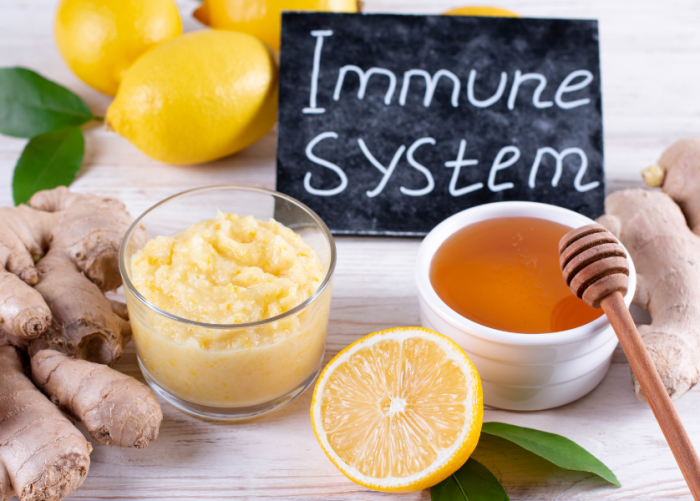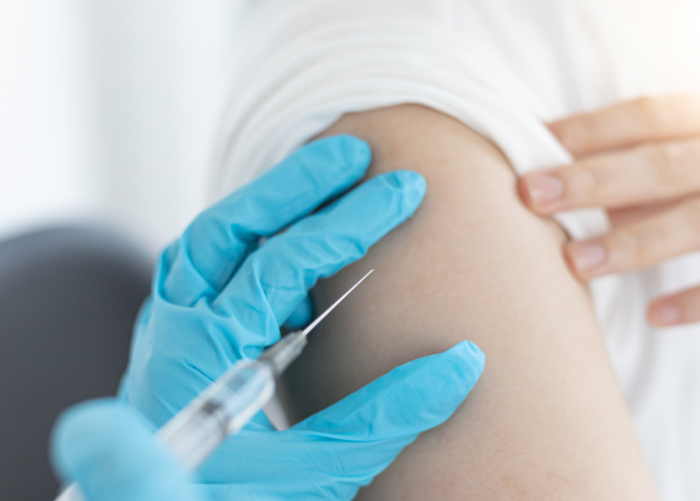It is quite common for children to fall sick from allergies, coughs and colds and ear infections during his early years. These childhood illnesses are often not serious but they do disrupt the family’s timetable, not to mention peace-of-mind, and the child’s development when he has to be taken to the doctor yet again to get well from another bout of flu after he has just healed from a skin infection. In this time of age when there are more and more pathogens floating about in the air and the world still has not completely eradicated Covid, it pays to help boost your child’s immune system so that he is protected and becomes less likely to get infections, but also more likely to recover faster should he fall sick.
If you have noticed, children are most susceptible to all kinds of infections especially from the ages of six months (after he begins weaning) to three years old when he is just beginning to move about in the outside environment. The reason he is easily susceptible to illnesses during this period is because his immune system has not yet matured.
The first five years, especially the first three, are the critical periods to strengthen your child’s immune system. A healthy immune system will help the child develop optimally in in the long run as it lays the foundation to his long term health.
Understanding the Immune System
 The immune system[1] is a child’s natural defence against bacteria, viruses, fungi and parasites that seek to invade his body the moment he is born. If it is inadequate and cannot mount an attack on invader germs that he comes into contact with, then the child falls sick.
The immune system[1] is a child’s natural defence against bacteria, viruses, fungi and parasites that seek to invade his body the moment he is born. If it is inadequate and cannot mount an attack on invader germs that he comes into contact with, then the child falls sick.
But what is and where is the immune system?
The immune system is a complex network of cells located all over his body such as his tonsils and adenoids, throat, thymus, digestive system, bone marrow (where white blood cells, antibodies and other chemicals are manufactured), skin, lymph nodes, spleen, and mucous membranes inside of the nose, inside of the bowel as well as genitals.
When a child is born, he is given natural antibodies and immunity through breast milk. Earlier maternal immunoglobulin G (IgG) was transferred through the placenta when he was still in the womb and this conferred short term passive immunity[2] against infections during the first few months of life.
However, by six months, the maternal IgG would have waned even though the child’s immune system has not yet been completed. It takes three to four years for a child’s immune system to become mature enough to produce his own antibodies. The interplay between the passive and active immune system is roughly between six months of age to three years and this is why children easily fall sick to all kinds of respiratory infections, inflammation, digestive issues and allergies and skin infections during this time.
Fortunately, even though his immune system will take its time to mature, there are many steps parents can take to help him build up his resistance. Here are nine suggestions.
1: Practice General Hygiene
 The simple act of washing hands after using the toilet or before touching food, is a good place to start. Wash with soap and water. Teach your child to wash his hands after playing outside, handling pets, blowing his nose and after arriving home from daycare or school.
The simple act of washing hands after using the toilet or before touching food, is a good place to start. Wash with soap and water. Teach your child to wash his hands after playing outside, handling pets, blowing his nose and after arriving home from daycare or school.
If you happen to be out with him and have no access to soap and water, bringing along disposable wipes to do a quick clean-up will work almost as well.
2: Practice Oral Hygiene
 Teach him to brush his teeth twice a day. The mouth is home to 700 species bacteria that live on the teeth, tongue and even in the pockets between the teeth and gums. That is why tooth decay can happen even when the child is having primary (baby) teeth.
Teach him to brush his teeth twice a day. The mouth is home to 700 species bacteria that live on the teeth, tongue and even in the pockets between the teeth and gums. That is why tooth decay can happen even when the child is having primary (baby) teeth.
Teach him the importance of oral hygiene and how to use a toothbrush to brush his own teeth by the age of two[3]. He would have developed enough finger and wrist dexterity by this time. But even before this, you should brush his teeth for him with a soft baby’s toothbrush as soon as his teeth appear at around six months.
3: Throw Away His Toothbrush When He is Sick
If your child gets a cold or flu, you should throw out his toothbrush immediately as it will prevent the virus living on his toothbrush from hopping on to other toothbrushes in the bathroom. For viral infections, your child cannot reinfect himself with the same virus but for bacterial infections such as Strep Throat[4], your child can reinfect himself with the same germs and also spread it to the rest of the family. Strep Throat is an extremely common childhood disease and an extremely infectious one too as it is spread through mucous and saliva by coughing, sneezing, sharing eating utensils or touching things that the infected person has touched (such as toys, colour pencils and so on). Definitely it lives on that toothbrush so throwing it away would be the first and easiest step in preventing the disease from spreading to the whole family.
4: Boost Gut Health
 The fact that 70% of the body’s immune system resides in the digestive tract is indication that one obvious way to boost your child’s immune system is by boosting his gut health. The digestive tract or gut is a tract that runs all the way from the mouth to the anus and which includes all the major organs such as the oesophagus, stomach and intestines. The gut is therefore responsible for breaking down food and absorbing the nutrients necessary for a growing body. It is also responsible for eliminating toxins and waste products from the body.
The fact that 70% of the body’s immune system resides in the digestive tract is indication that one obvious way to boost your child’s immune system is by boosting his gut health. The digestive tract or gut is a tract that runs all the way from the mouth to the anus and which includes all the major organs such as the oesophagus, stomach and intestines. The gut is therefore responsible for breaking down food and absorbing the nutrients necessary for a growing body. It is also responsible for eliminating toxins and waste products from the body.
One way to promote gut health in your child is by feeding him beneficial bacteria to balance out the bad bacteria so that it does an effective job. There is no point in feeding nutritious food if the digestive tract cannot absorb the nutrients.
The intestines are home to more than 100 trillion micro-organisms[5] that are mainly bacteria. They line the gastrointestinal tract and work hand-in-hand with the immune system to protect and eliminate harmful germs, viruses, fungi and pathogens that the body may come into contact with on an everyday basis.
An unbalanced gut compromises the effectiveness of the immune system and may be the reason for the child’s allergies or infections, skin issues, asthma, as well as anxiety, sleep problems, attention difficulties, lack of appetite, weight loss, weight gain, listlessness, depression and so on.
To promote gut health, you can give children foods that are rich in good bacteria. Feed plenty of fibre found in whole grains (brown rice, wholemeal bread, oatmeal, wholemeal and oats breakfast cereals), fruits and vegetables because these are prebiotics[6] which promote the gut’s healthy bacteria. Prebiotics are actually carbohydrates that the body cannot digest. The gut moves them to the lower digestive tract where they act like food to help the healthy bacteria grow. Children need up to about 25 grams of fibre daily which can help move the bowels and prevent constipation ─ a frequent childhood problem.
Probiotics[7], on the other hand, are live bacteria and yeasts that, when eaten, increase the number of good bacteria in the body. Yoghurt, live culture drinks, tempeh, sourdough bread, and some cheeses such as traditionally aged Gouda, Cheddar, Swiss, and Cottage Cheese, are some of the foods that are probiotics-rich. Both prebiotics and probiotics act together to add to the richness of the gut microflora and help the digestive and immune system stay healthy.
Morinaga Chil-kid, a Japanese formulation that is 100% derived from cow’s milk from the Netherlands, and designed specially for Asian children aged one to seven, contains Nucleotides and dietary fibre Galacto-ogliosaccharide. This means that for the child who is still on his way to developing a matured immune system, a glass or two of Morinaga Chil-kid everyday can help ensure that he receives all that he needs to maintain and build gut health, should he be lacking the intake from his diet.
• Nucleotides and Dietary Fibre in Morinaga Chil-kid
What are Nucleotides? They are organic molecules that are the building blocks of nucleic acids (RNA and DNA) that regulate chemicals in the body to build new cells. They play an immunomodalatory role in enhancing the immune system as well as the growth and repair of the gut. When tissues, cells or DNA need repair, nucleotides are the raw materials needed to facilitate the rejuvenation and regeneration of cells. Studies have proven[8] that nucleotides have the ability to the immune function and help the body fight off infections and diseases.
Dietary fibre such as Galacto-ogliosaccharides (GOS), on the other hand, are prebiotics added into the formulation to provide” food” to feed and grow good bacteria or microflora in the intestines. GOS has several functions in digestive health and the immune system of young children. GOS feeds the Bifidum and Acidophilus[9] strains of bacteria in the gut, which results in stool frequency and decreased faecal PH[10] ─ a critical indicator of child gut health and resistance against gut pathogen invasion[11]. Supplementation of milk formula with GOS is therefore necessary as it improves intestinal microflora and fermentation[12], keeps the gut (and mind) healthy and the whole body system working at optimum level.
5: Encourage Eating a Healthy, Balanced Diet
 Not only should parents focus on improving their child’s gut health, they should also ensure their child is fed the right foods appropriate for their age group and taught about the benefits of choosing good foods as opposed to junk food and processed or high fat, high sugar or high salt foods.
Not only should parents focus on improving their child’s gut health, they should also ensure their child is fed the right foods appropriate for their age group and taught about the benefits of choosing good foods as opposed to junk food and processed or high fat, high sugar or high salt foods.
It is not that a child cannot eat candies or deep fried and oily meals found at all our local stalls and restaurants. The idea is to limit the intake of such foods and have them replaced by more nutrient-dense alternatives.
Examples of a healthy diet[13] for children include: Protein (seafood, lean meat, eggs, beans, nuts and seeds), Fruits (fresh, frozen or dried), Vegetables (especially colourful ones), Whole grains (whole wheat pasta, oatmeal, quinoa, brown rice) and Dairy (milk, yoghurt, cheese and also fortified soy beverages which also count as dairy.
Again, if a child is not inclined to eat these foods, or you yourself have had no time to supervise and prepare his meals for him owing to a busy lifestyle, then a glass or two of Morinaga Chil-kid can supplement the nutrients lacking in his diet.
Morinaga Chil-kid is packed with over 45 essential nutrients including ARA and DHA for brain development, GOS, five Nucleotides, Omega 3&6 Long-Chain Polyunsaturated Fatty Acids (LCPs) and 27 vitamins and minerals including Folic Acid, Iron and Zinc.
• Folic Acid, Iron and Zinc
Folate and Folic Acid is a B vitamin that helps your child’s body develop correctly and gives them energy that meets their growing up demands. Folic Acid helps with cell and tissue growth as well as synthesize and repair DNA and RNA. Folic Acid supports brain development and digestive, nervous and immune systems. Children need Folic Acid to make red blood cells to move oxygen and energy around the body preventing low energy and shortness of breath. There is even evidence to show that Folic Acid may boost a child’s language skills[14]and may reduce the risk of strokes and other cardiovascular diseases later in life.
Minerals play an indispensable role in the health of children and among the most important are Iron and Zinc[15]. Iron is a constituent of haemoglobin in red blood cells, which helps transport oxygen from the lungs to the organs in the body as well as transports carbon dioxide from the tissues back to the lungs. Iron is also a component of myoglobin, a protein that stores and supplies oxygen to working muscles. As such, Iron plays an important role in the immune system because it participates in the construction of many immune system enzymes.
A lack of Iron in the body can lead to Iron Deficiency Anaemia. The child’s skin would be pale especially on the palms, soles, ears, eyelids, mucous membranes, and tongue. The child’s hair would also be brittle and dry and he would be tired, slow, sleepy and less focused while being irritable, anorexic and lose weight.
Zinc is widely distributed in the groin, hair, bones, liver, kidneys and other organs. Although constituting a miniscule amount in the body, Zinc has an extremely important biological role. Zinc participates in the composition of many enzymes and is an indispensable catalyst in the process of DNA replication. Therefore, Zinc is especially important in the development of height and weight of children. Zinc helps build a healthy immune system by stimulating the growth of B lymphocytes. It is an essential mineral for the development of memory centres in the brain.
Those with Iron Deficiency Anaemia would also usually be Zinc deficient. The cause is usually poor meal quality, unvaried foods and little meat. Zinc deficiency is linked to[16] decreased growth, increased colds and infections, impaired memory, learning disabilities and poor attention span.
So isn’t it good to know that Moringa Chil-kid includes Zinc as one of its many nutrients?
6: Make Sure Your Child Gets Enough Sleep
 Sleep is the time for restoration. It is a time for children’s bodies to recharge and retain the information they have learnt throughout the day. Sleep is also a time when brain development occurs and when cells in the body grow and are repaired.
Sleep is the time for restoration. It is a time for children’s bodies to recharge and retain the information they have learnt throughout the day. Sleep is also a time when brain development occurs and when cells in the body grow and are repaired.
Studies have shown[17] that kids who regularly get an adequate amount of sleep have improved attention spans, behaviour, learning, memory, and overall mental and physical health.
So how much sleep do children need? Children at one to two years old should get 11 to 14 hours, while those three to five years of age should sleep 10 to 13 hours every night. School-going children from ages six to 12 should sleep nine to 12 hours.
7: Make Sure Your Child Gets Enough Exercise

Being fit, strong and active is always good for health. In children, the same applies. According to a 2019 research review, exercise can stimulate cellular immunity by increasing the circulation of immune cells. Another study says[18] high physical activity in young children has positive effects by altering auto-antigen induced immune activity. Besides bringing positive effects such as improved lung function, enhanced motor skill development, healthier body composition, and also improved defence against inflammatory diseases, it promotes bonding and quality time if the family exercises or plays a sport together.
8: Lower His Stress Levels
 Many studies have shown that stress can hamper one’s immune system. When a child is constantly being pressured to study, study, study in order to get high marks or has to experience long term difficult situations in the family, he can experience toxic stress[19]. When a child experiences toxic stress, the Hypothalamic Pituitary and Adrenal (HPA) hormone axis gets over-activated. This results in blood levels of the stress hormone Cortisol to elevate and this can result in long term changes in inflammation and immunity. Toxic stress in children not only shapes their physical health but also their emotional health and personality when they grow up.
Many studies have shown that stress can hamper one’s immune system. When a child is constantly being pressured to study, study, study in order to get high marks or has to experience long term difficult situations in the family, he can experience toxic stress[19]. When a child experiences toxic stress, the Hypothalamic Pituitary and Adrenal (HPA) hormone axis gets over-activated. This results in blood levels of the stress hormone Cortisol to elevate and this can result in long term changes in inflammation and immunity. Toxic stress in children not only shapes their physical health but also their emotional health and personality when they grow up.
9: Stay Up-To-Date On Your Child’s Recommended Vaccinations
 Keeping up-to-date with your child’s childhood vaccinations can definitely help the immune system fight dangerous and even life-threatening diseases. Vaccines[20] contain a dead or weakened part of the germ so that it prepares the body to make antibodies to fight that disease the moment it recognises the germ entering the body. Vaccinations therefore confer your child specific active immunity against specific diseases for life.
Keeping up-to-date with your child’s childhood vaccinations can definitely help the immune system fight dangerous and even life-threatening diseases. Vaccines[20] contain a dead or weakened part of the germ so that it prepares the body to make antibodies to fight that disease the moment it recognises the germ entering the body. Vaccinations therefore confer your child specific active immunity against specific diseases for life.
The Malaysian National Immunisation Programme (NIP)[21] provides free vaccinations at all government clinics to protect children against 13 major childhood diseases. They are: Diphtheria, Haemophilus Influenzae Type B (Hib), Hepatitis B, Human Papillomavirus (HPV), Japanese Encephalitis (JE), Measles, Mumps, Pertussis or Whooping Cough, Polio, Rubella, Tetanus, Tuberculosis (TB) and Pneumococcal.
Most of these vaccinations are given within the first two years of a child’s life and it is recommended that a parent does not delay or skip these vaccinations.

 The
The  The simple act of washing hands after using the toilet or before touching food, is a good place to start. Wash with soap and water. Teach your child to wash his hands after playing outside, handling pets, blowing his nose and after arriving home from daycare or school.
The simple act of washing hands after using the toilet or before touching food, is a good place to start. Wash with soap and water. Teach your child to wash his hands after playing outside, handling pets, blowing his nose and after arriving home from daycare or school. Teach him to brush his teeth twice a day. The mouth is home to 700 species bacteria that live on the teeth, tongue and even in the pockets between the teeth and gums. That is why tooth decay can happen even when the child is having primary (baby) teeth.
Teach him to brush his teeth twice a day. The mouth is home to 700 species bacteria that live on the teeth, tongue and even in the pockets between the teeth and gums. That is why tooth decay can happen even when the child is having primary (baby) teeth. The fact that 70% of the body’s immune system resides in the digestive tract is indication that one obvious way to boost your child’s immune system is by boosting his gut health. The digestive tract or gut is a tract that runs all the way from the mouth to the anus and which includes all the major organs such as the oesophagus, stomach and intestines. The gut is therefore responsible for breaking down food and absorbing the nutrients necessary for a growing body. It is also responsible for eliminating toxins and waste products from the body.
The fact that 70% of the body’s immune system resides in the digestive tract is indication that one obvious way to boost your child’s immune system is by boosting his gut health. The digestive tract or gut is a tract that runs all the way from the mouth to the anus and which includes all the major organs such as the oesophagus, stomach and intestines. The gut is therefore responsible for breaking down food and absorbing the nutrients necessary for a growing body. It is also responsible for eliminating toxins and waste products from the body. Not only should parents focus on improving their child’s gut health, they should also ensure their child is fed the right foods appropriate for their age group and taught about the benefits of choosing good foods as opposed to junk food and processed or high fat, high sugar or high salt foods.
Not only should parents focus on improving their child’s gut health, they should also ensure their child is fed the right foods appropriate for their age group and taught about the benefits of choosing good foods as opposed to junk food and processed or high fat, high sugar or high salt foods. Sleep is the time for restoration. It is a time for children’s bodies to recharge and retain the information they have learnt throughout the day. Sleep is also a time when brain development occurs and when cells in the body grow and are repaired.
Sleep is the time for restoration. It is a time for children’s bodies to recharge and retain the information they have learnt throughout the day. Sleep is also a time when brain development occurs and when cells in the body grow and are repaired. 
 Many studies have shown that stress can hamper one’s immune system. When a child is constantly being pressured to study, study, study in order to get high marks or has to experience long term difficult situations in the family, he can experience
Many studies have shown that stress can hamper one’s immune system. When a child is constantly being pressured to study, study, study in order to get high marks or has to experience long term difficult situations in the family, he can experience  Keeping up-to-date with your child’s childhood vaccinations can definitely help the immune system fight dangerous and even life-threatening diseases.
Keeping up-to-date with your child’s childhood vaccinations can definitely help the immune system fight dangerous and even life-threatening diseases.